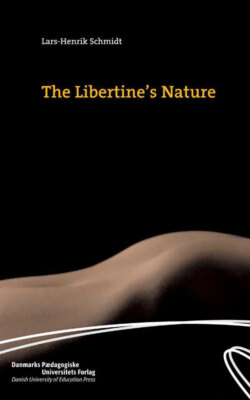Читать книгу The Libertine's Nature - Lars-Henrik Schmidt - Страница 8
На сайте Литреса книга снята с продажи.
The Way It Goes
ОглавлениеWith the interpretive construction and constructive interpretation proposed by this book I aim to do two things.
In part, using the perspective of the history of ideas, I will read Sade generally as a philosopher, comparing him with other writers from the Enlightenment and connecting his ideas to the great themes of the era, particularly his concept of nature, and specifically read him as one of the originators of an anthropological discourse and of the aesthetics of the sublime. In terms of the history of ideas, the most important interlocutors here will be Rousseau, Kant, and Nietzsche.
And, in part, using the perspective of Social Analytics and Sade as the occasion, I will attempt to construct a “theory of pleasure” with a view to undertaking a revaluation of the priority given to “the other” in traditional (and this of course more or less means Christian) moral philosophy. Hereby I hope to be able to bring about a displacement (from suffering to pleasure, from regard to respect, and so on) that can prepare for a different ethics.
So as to realize this project, my presentation falls into three sections. The first part is an attempt to present and locate Sade’s complex of problems through his aesthetics and his philosophy of nature, and its objective is to demonstrate that it is worth listening to Sade. The second part is a presentation and transgression of Sade’s lesson in pleasure, in which it will be demonstrated that on Sadian premises one can take a entirely non-Sadian route. In light of this, the third part tries out Sade’s will to transgress the prohibitions of nature and humanity, and it seeks to demonstrate his limitation.
Hence: the first part concerns a displacement from nature to physiology or sensuality; the second part is about a displacement in pleasure from the other’s pain to one’s own craving, and finally the third part is about a displacement from prohibition to abstention.
In short, the thesis is that it is not possible for Sade to transgress the social, but that precisely in his failure lies the condition for the possibility of letting an ethics cast anchor in the maelstrom. Sade’s will to transgression unwittingly happens to indicate a point for the social. In reality, his misfortune indicates what I shall call our dis-fortune. Using the history of ideas as an interpretive construction and a constructive interpretation, it is then my aim to render plausible the thesis of this book, which experiments with overcoming Sade’s complex of problems through a presentation of and reconciliation to Sade’s limitation – a limitation that consists of nothing less than the social self.
